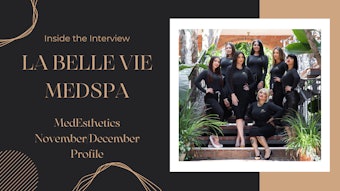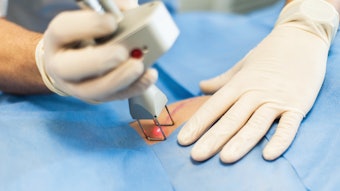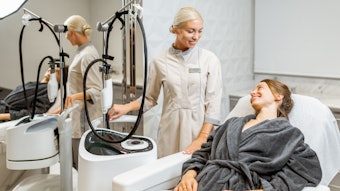
If you’re like most people, you harbor a secret goal. Perhaps you think to yourself, “I’d really like to start publishing,” or you have an idea for a product that would improve patient care and think, “How do I get this made?”
Expanding your career beyond patient care can help combat burnout, bring in additional revenue and add prestige to your credentials. The challenge is determining how to take those first steps down a new career path.
Product development, conducting clinical trials, publishing in scientific or trade journals, and lecturing at meetings are just a few of the directions in which practitioners may take their careers. Those who have pursued such additional roles stress that, although it takes time and effort, expanding your career to include multiple roles within your specialty is well worth the effort.
Taking Part in Clinical Trials
Michael Gold, MD, founder and medical director of Gold Skin Care Center in Nashville, Tennessee, first got involved in conducting clinical trials 25 years ago when he contacted a company cited in an article he had read. He had used the company’s products, and the facility was nearby in Memphis, Tennessee. The company offered Dr. Gold a chance to conduct his first clinical trial. “It was luck on my part,” he says of that fortuitous phone call. Today, conducting clinical research is a significant part of his practice.
When he first started, clinical trials were not as controlled or organized as they are today, says Dr. Gold. Physicians who get involved in this area of medicine will need to hire or redirect staff to follow strict protocols and deal with the ample paperwork required for clinical trials.
“Everything has to be done in a certain way. There are no shortcuts,” he says. Dr. Gold’s center now employs a director of research whose job is to oversee this aspect of the business. “You have to do that paperwork and you, as a physician, have to sign off on everything. You have to have a person you trust,” he says.
As the medical aesthetic industry has grown and clinical trials have become more regulated, it can be more challenging to move into this area of research. The best place to start is with a manufacturer you admire or their sales representatives. “They will go back and champion your desire to be involved in research,” says Dr. Gold. “Or you can get in touch with regional managers. They may have a little more sway in getting you involved.” He also suggests seeking out mentors who will advise you along the way.
“I had a lot of role models I talked with,” he says. “It’s a learning experience—not everything is going to go perfectly all the time.”
Facial plastic surgeon Steven Pearlman, MD, past president of the American Academy of Facial Plastic and Reconstructive Surgery (AAFPRS), says that being acquainted with a manufacturer’s products is helpful, but far from all that is needed to become involved in a manufacturer’s clinical trial. “Definitive knowledge of HIPAA regulations and IRB protocols (that govern human trials) for patient protection is extremely important,” he says.
Geoffrey Gurtner, MD, a plastic and cosmetic surgeon and professor of plastic surgery at the Stanford School of Medicine, recommends that physicians target areas in which they have expertise for clinical trials. “You should focus on things you do a lot of,” he says. “You need a lot of patients for a clinical trial and you need to have a practice in an area where that technology is being brought to bear.”
Image copyright Thomas Barwick/Getty Images.
[pagebreak]
Staying Active in Academia
Dermatologist Deanne Robinson, MD, of SkinCare Physicians in Chestnut Hill, Massachusetts, thrives on having a diverse career. She is a volunteer professor at Yale-New Haven Hospital in New Haven, Connecticut, and remains active in clinical research. When she entered private practice several years ago, she knew she would miss her role as chief resident of dermatology. “I came into private practice with the vision that I would still be involved in academics,” she says.
Dr. Robinson made a point of staying in touch with her academic contacts and signed on as a volunteer clinical instructor of dermatology at Yale-New Haven Hospital where once a month she teaches residents and medical students.
“I really like teaching,” she says. “And it’s nice to be able to go back and be with the physicians you trained with. It’s a continual learning process.”
Teaching residents gives her experiences she might not otherwise have, such as participating in grand rounds where she sees rare cases often not encountered in private practice.
Physicians who would like to take on the role of teacher can start by reaching out to the directors of the programs from which they graduated or connecting with local medical schools and universities to offer their services as either volunteer or paid instructors.
Dr. Robinson is also involved in clinical research at SkinCare Physicians and has acted as principal investigator for several trials. The first step in entering the arena of research is to formulate a question, she says.
“It’s something I think about when I’m seeing patients,” says Dr. Robinson. “Wouldn’t it be nice if we had something to treat this (particular condition), but without the side effects?”
Once you’ve formulated your question, she recommends contacting state and national professional medical associations to learn whether they offer research grants. “If you have an idea for a trial, see if there is a mentorship program or any research grants available,” she says.
The more research you do, the better you become. “As you become more involved in trials, you become more proficient,” says Dr. Robinson. Like Dr. Gold, she stresses the importance of having trained staff members who can help to find appropriate patients for the trial, secure their participation and help complete the required paperwork. “They are paramount in helping things run smoothly,” she says.
Pursuing Product Development
Dr. Gurtner has juggled multiple roles in his career, including teaching, conducting research, seeing patients in clinic and developing new products. His most recent innovation to come to market is Aline, a dermal filler that uses solid threads of hyaluronic acid similar to fishing line. When inserted in a wrinkle, it absorbs moisture from the skin and plumps. The filler was recently acquired by Allergan.
Dr. Gurtner also is one of the founders of Neodyne Biosciences, the company that makes the embrace Advanced Scar Therapy device.
In the past, physicians would often bring ideas to manufacturers in hopes of getting the product into development. But this approach has not worked for Dr. Gurtner. “It never happened for me. It’s a frustrating way to do it,” he says.
As companies cut back on financial support for research and development, the best way to get ideas to the marketplace is to invest your own money. “Use your own money to get your idea as fully baked as possible,” says Dr. Gurtner. “At that point you may get more traction with companies.”
To make the product attractive to manufacturers, he advises physicians to first secure intellectual property rights and develop a prototype. “It makes it more tangible for a company to look at,” says Dr. Gurtner. He estimates that this process will require thousands to tens of thousands of dollars. “It may require some modest expenditure, but it’s less than what most people may think,” he says.
Image copyright Thomas Barwick/Getty Images.
[pagebreak]
Joining the Lecture Circuit
The goal of lecturing at scientific meetings requires less outlay of cash and can be a valuable gateway to expanding one’s career and increasing one’s professional network. To get involved, physicians simply need to reach out to conference organizers and offer their services.
Once you’ve determined a subject on which you feel qualified to present, “start with the small conferences and volunteer to speak,” says Dr. Pearlman. “Send topics to meeting organizers well in advance of the conference, because the programs are often determined many months in advance.”
Another way to build a resume that will lead to teaching and lecturing opportunities is to start branching out in your own community and grow from there. “Offer to give resident lectures or grand rounds at your local hospital,” says Dr. Pearlman. “That will help provide groundwork for submitting to larger meetings.”
For those physicians who have successfully expanded their careers to new areas, the payoff is not always in dollars. Conducting clinical research, for instance, is typically not a significant revenue source in and of itself. “It’s rare for it to be a meaningful part of your revenue. You shouldn’t go into it thinking it’s an easy way to make money,” says Dr. Gurtner.
Conducting trials can increase revenue through less direct channels, however. These efforts often help practices attract new patients who, like the physicians, want access to the newest proven products and devices. “Patients are interested in whoever has the latest and the greatest. They’re interested in new technology,” says Dr. Gurtner.
Dr. Gold finds that being involved in research instills confidence in patients when he introduces new procedures. “We can tell our patients, ‘We know how this works because we did the research on it,’” he says.
The joy of learning, of guiding others and finding answers to nagging questions is what motivates Dr. Robinson to continue to multitask and juggle the roles of teacher, researcher and writer. “The majority of what I do is on a volunteer basis,” she says. “I don’t think people go into research for monetary gain. They go into it for the knowledge.”
That first phone call Dr. Gold made 25 years ago has enhanced his career in ways he never expected, including the development of a busy research center and invitations to speak at conferences around the world.
“I didn’t start out wanting to be on the world lecture circuit, but ended up loving it. You don’t do this because you’re going to make a gazillion dollars from it,” he says. “You do it because you love to teach. You love to meet your colleagues and you love to travel. It’s a wonderful feeling to walk into a conference and know people. And hopefully, I’ve made a difference.”
Annemarie Mannion is a freelance writer based in Chicago.
Image copyright Thomas Barwick/Getty Images.











